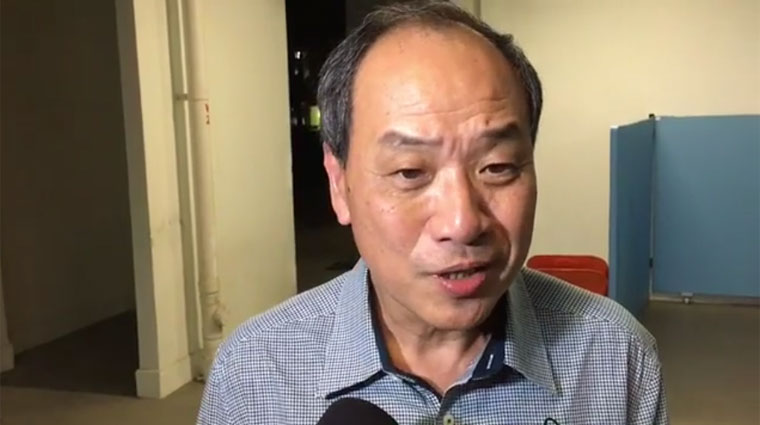When Prime Minister Lee Hsien Loong made his speech in Parliament about significant changes to the political system on Jan. 27, 2016 -- four months after the PAP's comfortable win in the general election in September last year -- all eyes were on Workers' Party chief Low Thia Khiang.
This was so as WP would in reality stand to gain the most from the slew of new proposed constitutional changes.
Hypothetically, if the number of opposition MPs had already been raised from nine to 12 and given the lopsided GE2015 result, WP MPs would have taken up all 12 opposition seats in parliament.
In fact, the last six out of seven NCMPs so far have all come from the WP.
So, there shouldn't be too much the WP can complain about.
However, during a doorstop interview at his meet-the-people session at Bedok Reservoir ward of Aljunied GRC on Wednesday evening with reporters who had staked out to get a quote from Low, he simply smiled and then furrowed his brow in his trademarked style, and casually rattled off a list of what's wrong with the full voting rights NCMP scheme.
Here are the main points he dished out off the top of his head:
1. Being an MP is not just about showing up in parliament to talk. You have to be on the ground to do.
2. And because there are no constituents to serve, an NCMP won't be grounded and cannot argue policy from an informed base.
3. And when there is no constituents to serve directly, there is essentially no support base.
4. But the real problem is that the opposition cannot even gain access to proper venues to work and understand the ground to begin with, as venues are resources they don't have access to by virtue of being in opposition.
5. NCMPs, ultimately, might not even strengthen the political system as they cannot fully immerse themselves in contestable politics.
6. It might even be ironic that the NCMP scheme with full voting rights becomes a crutch where opposition members vie for these seats instead of wanting to become real MPs.
Here's the video:
And here's the transcript of Low Thia Khiang's reply:Being an MP is not just talk
We have noted the PM's proposal on the change in the political system.
As it involves party position, we will have to study it carefully and also weigh the implication of the system in the long term interests of Singapore.
Especially in terms of how you can build a viable opposition in order to contest politically.
I believe that the opposition is not just going to parliament and talk. To have a functional democracy, you need to have a position to be able to contest and put the government on its toes and contest for votes.
So it's not simply going to parliament and air your view. Parliament is more than just a forum, it is representative of the people.
[...]
NCMPs are handicapped because they cannot serve constituents -- like duck weed
NCMP is just a duckweed on the water of the pond. You don't have roots unlike elected MPs where you have a constituency, you run town council, you get in touch with your residents and you can sink roots there.
But NCMP is very different. So, NCMPs, make no mistake about it, NCMPs are not elected MPs. They may have the same voting rights in parliament, but that is only pertaining to parliament.
NCMP doesn't give any political party muscle, because you don't have the competitive advantage on the ground. And neither does it help you to build your strength in political competition because it doesn't give you more resources, doesn't give you more ground feel.
Unlike elected MPs where you conduct Meet-the-People sessions every week, run town councils where you know the problems of the town, so these are all realities of politics that will give you the reality of the ground, whereby in terms of discussing policy, you will be more grounded.
So, it's quite different, NCMPs in terms of just having debates in parliament. Unless the NCMP really goes to the ground, to scout the ground, to get opinions from the ground, which sometimes can be quite difficult because you may not even have the proper venue, for instance, to conduct Meet-the-People sessions to meet the people.
So it might in the end of the day, end up academic. But, of course, we contest elections we have to have the pulse of the ground. But on the other hand, NCMP can't compare any way to MPs.
[...]
NCMPs have limited role in a real functional democracy -- like a vase
Question: Overall the PM said the changes will help the opposition. Do you agree with his view?
Well, depending on how you look at it, we are still assessing the impact of it. I'm not sure whether it helps opposition, or over time, will make a position just satisfied competing for NCMP instead of trying to get elected.
So, whether or not in the long run the revised NCMP scheme will be helpful to strengthen the political system in Singapore, I'm not sure.
Because to really strengthen the political system, you need competition as what the PM said, contestable politics, I'm not sure whether or not that in the long run the scheme will help.
On the contrary, an opposition party may go in to run, hopefully to get into parliament as NCMP. I think that will be ironic of the system.
And opposition in the form of NCMP, then may just be a vase. Not the real functional democracy and contestable politics as what the prime minister wishes to see.
Top photo via The Straits Times Facebook
If you like what you read, follow us on Facebook and Twitter to get the latest updates.
If you like what you read, follow us on Facebook, Instagram, Twitter and Telegram to get the latest updates.
